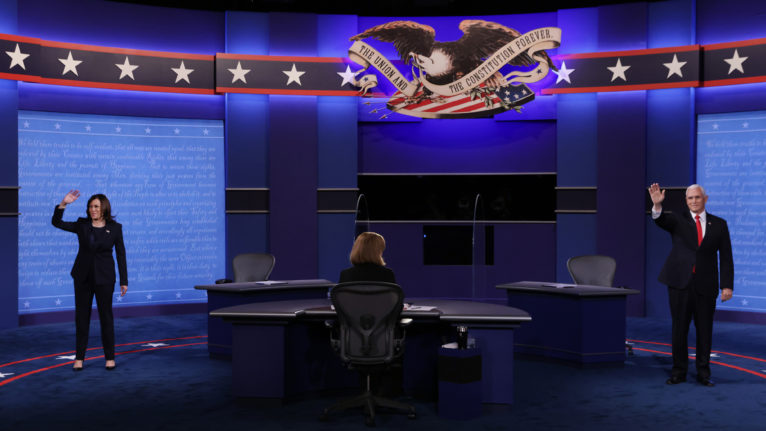Civility takes the stage, with policy a primary focus during vice presidential debate
Vice Presidential candidates Senator Kamala Harris (left) and Vice President Mike Pence (right) greet the audience before the debate on October 7, 2020. (Alex Wong/Getty Images)
Wednesday night, Vice President (VP) Mike Pence and Senator Kamala Harris took the stage at the University of Utah in Salt Lake City to debate policy and elaborate on their campaign plans to move the nation forward.
The recent COVID-19 outbreak within the White House motivated the evening’s debate to include additional precautions. The VP candidates were seated twelve feet apart, with Plexiglass installations separating them further. All audience members were required to wear a face mask throughout the duration of the debate.
While the first presidential debate received criticism for its chaos, moderator and USA Today’s Washington bureau chief Susan Page ensured that this round would not follow the same path. Page established the ground rules for both VP candidates early on, reminding them that while a lively debate is encouraged, “Americans also deserve a discussion that is civil.” Her pledge to maintain that civility as moderator was upheld, and the debate progressed with minimal personal attacks and a primary focus on policy.
COVID-19
The first question of the night revolved around the COVID-19 pandemic. Asked how the Biden administration would differ in its response to the crisis as compared to the Trump administration, Senator Harris responded with statistics about the impact of COVID-19 on small businesses, “sacrificial workers,” and victims of the virus. She emphasized Biden’s national strategy to expand contact tracing and testing, as well as provide a free vaccine for all Americans. In response, VP Pence argued that President Trump’s suspension of travel from China early on increased efficiency of national mobilization against the virus, giving the administration more time to reinvent a testing system. He also praises the support provided to healthcare workers by the Trump administration, promising millions of vaccine doses before the end of the year through Operation Warp Speed.
President Trump’s Health
President Trump’s recent visit to Walter Reed Medical Center in Texas also prompted questions. When asked whether a president’s health condition is something voters deserve to know about, VP Pence highlighted transparency from White House physicians thus far and said that transparency will continue to be upheld. Senator Harris agreed that transparency is critical, and extended her argument for transparency beyond health records and into the realm of finances.
Unemployment Solutions
Senator Harris was asked how the Biden administration would enable employment in the wake of the economic recession the United States is currently experiencing. She responded by elaborating on Biden’s plan to invest in infrastructure, as well as dedicate resources towards alternative and clean energy research and development. She quoted a Wall Street firm’s estimate that this plan would bring seven million more jobs to Americans. Emphasizing Biden’s commitment to education, she also touched on his promises to reduce all current student loan debt by $10,000 and make public universities free for all students whose families fall under a certain income bracket. VP Pence responded by highlighting President Trump’s fight for free and fair trade and attempts to provide direct checks to families suffering. He also criticized Biden’s stance on clean energy and climate change, arguing that its economic impacts would outweigh environmental positives.
Climate Change
One of the most pressing issues debated was climate change and what the appropriate response should be to its impending arrival. VP Pence reiterated that he was proud of the Trump administration’s record on the environment and conservation, criticizing the Biden camp for their endorsement of the Green New Deal, which Senator Harris vehemently denied. VP Pence also hammered Biden’s stance on fracking, mentioning multiple times that Biden hopes to eliminate fracking completely. Senator Harris repeatedly denied this claim, as well. Both VP candidates were in favor of “following the science.” Senator Harris delved into Biden’s environmental plan, citing his goals to create jobs around the climate change response, fully eliminate carbon emissions by 2050, and re-enter the Paris Climate Accord “with pride.” VP Pence disputed the reasoning behind this claim and argued that the Biden alternative energy plan would require a significant tax increase.
Criminal Justice Reform
When asked whether she thought justice had been served in the Breonna Taylor grand jury decision, Senator Harris cited her prosecutorial history and disappointment with how the case was handled. She proposed criminal justice reforms within the Biden administration, including a ban on chokeholds and carotid holds, a national registry for law enforcement officers with criminal histories, and abolition of private prisons. VP Pence expressed his sympathy for Taylor’s death, but argued that the justice system had worked as intended. He also condemned rioting and looting that followed the death of George Floyd, and called accusations of implicit bias and systemic racism within law enforcement departments “a great insult.” Senator Harris retorted by offering examples of President Trump’s past statements and executive decisions that she argued targeted America’s minority populations.
The debate was brought to an end with a question from Utah eighth-grader Brecklynn Brown, who urged the VP candidates to get along and put politics aside for the sake of citizens. VP Pence responded by citing the friendship of the late Supreme Court justices Antonin Scalia and Ruth Bader Ginsburg, whose staunch conservative and liberal stances, respectively, did not get in the way of a respectful partnership. Senator Harris agreed, adding that the question was an indictment on who politicians are and who they should be.
With the threat of COVID-19 ever present, this debate brought a sense of normalcy back to political discussion and set an example for civil debates moving forward. The next presidential debate between President Trump and former VP Biden is scheduled for October 15 and will be conducted virtually due to President Trump’s COVID-19 diagnosis.
Your donation will support the student journalists of Highlands High School. Your contribution will allow us to cover our annual website hosting costs.



